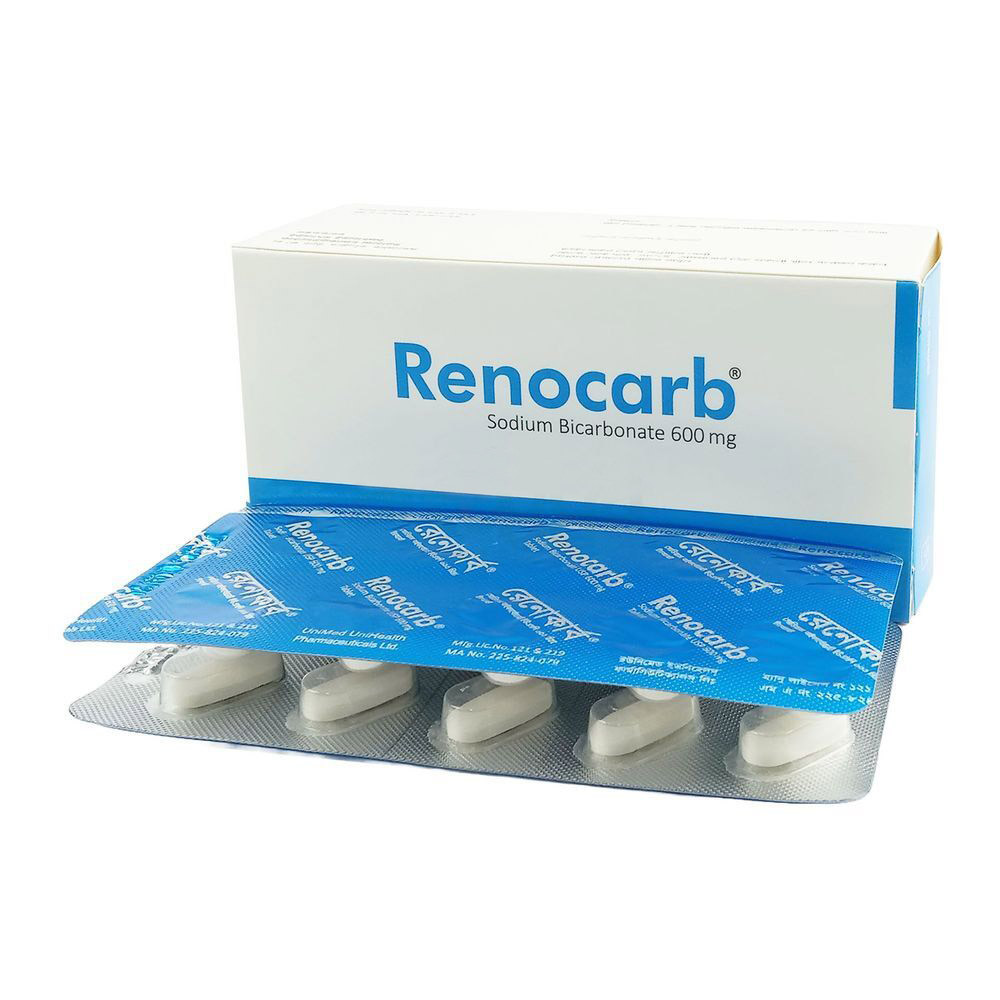Unit Price:
৳ 7.00
(6 x 10: ৳ 420.00)
Strip Price:
৳ 70.00
Indications
Renocarb is indicated in-
1. Management of acidosis in cardiac arrest.
2. Alkalinization of urine.
3. Management of metabolic acidosis in:
1. Management of acidosis in cardiac arrest.
2. Alkalinization of urine.
3. Management of metabolic acidosis in:
- Severe renal disease
- Uncontrolled diabetes
- Circulatory insufficiency from shock or dehydration
- Severe primary lactic acidosis
* রেজিস্টার্ড চিকিৎসকের পরামর্শ মোতাবেক ঔষধ সেবন করুন
Pharmacology
Sodium bicarbonate is a systemic alkalizer, which increases plasma bicarbonate, buffers excess hydrogen ion concentration, and raises blood pH, thereby reversing the clinical manifestations of acidosis. It is also a urinary alkalizer, increasing the excretion of free bicarbonate ions in the urine, thus effectively raising the urinary pH. It also replenishes electrolyte imbalance in severe diarrhea where the loss of bicarbonate can be significant.
Dosage & Administration
Oral: The usual dose is 300 mg to 2 grams, 1 to 4 times daily.
Intravenous (Severe metabolic acidosis):
Intravenous (Severe metabolic acidosis):
- Adult: By slow inj of a hypertonic solution of up to 8.4% (1000 mmol/L), or by continuous infusion of a weaker solution, usually 1.26% (150 mmol/L). For correction of acidosis during advanced cardiac life support procedures, 50 ml of an 8.4% solution may be given.
- Elderly: Dosage adjustments may be required.
* রেজিস্টার্ড চিকিৎসকের পরামর্শ মোতাবেক ঔষধ সেবন করুন
Interaction
Some drugs that may interact with Renocarb are: Aspirin and other salicylates, memantine, medications with enteric coating. Potentially hazardous interactions with Corticosteroids and Corticotropin, Alkalis, Calcium, Diuretics and Potassium. It can decrease the effectiveness of certain drugs including Ampicillin, Atazanavir, Ketoconazole, Itraconazole, Iron supplements, Sucralfate etc.
Contraindications
This drug is contraindicated in hypersensitivity hypoventilatory states, excessive chloride depletion owing to continuous gastric fluid loss from vomiting or GI suctioning, metabolic and/or respiratory alkalosis, hypocalcemia and diuretics known to produce hypochloremic alkalosis.
Side Effects
Common side effects:
- Headache
- Nausea
- Irritability
- Muscle weakness
- Slow reflexes
- Confusion
- Swelling of the feet or ankles
- Black tar-like stools
- Coffee-ground vomit
Pregnancy & Lactation
Use during pregnancy only if the potential benefit justifies the potential risk to the fetus. Pregnant women: Based on animal data showing adverse renal effects, it is not recommended during the second and third trimesters of pregnancy. It may worsen high blood pressure. This medication may pass into breast milk.
Precautions & Warnings
Caution should be taken for patients with pre-existing heart disease, kidney disease, liver disease, high blood pressure, any allergies because this medication contains salt (sodium), do not use it if you are on a salt restricted diet.
Overdose Effects
If alkalosis results, the bicarbonate should be stopped and the patient managed according to the degree of alkalosis present. 0.9% sodium chloride injection intravenous may be given; potassium chloride also may be indicated if there is hypokalemia. Severe alkalosis may be accompanied by hyperirritability or tetany and these symptoms may be controlled by calcium gluconate. An acidifying agent such as ammonium chloride may also be indication in severe alkalosis
Therapeutic Class
Intravenous fluid preparations, Urinary Alkalinizing Agent
Storage Conditions
Do not store above 30°C, protect from light & moisture. Keep the medicine out of reach of children.

